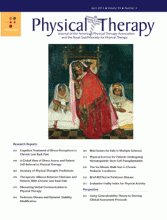Abstract
Background The impact of the relationship (therapeutic alliance) between patients and physical therapists on treatment outcome in the rehabilitation of patients with chronic low back pain (LBP) has not been previously investigated.
Objective The purpose of this study was to investigate whether the therapeutic alliance between physical therapists and patients with chronic LBP predicts clinical outcomes.
Design This was a retrospective observational study nested within a randomized controlled trial.
Methods One hundred eighty-two patients with chronic LBP who volunteered for a randomized controlled trial that compared the efficacy of exercises and spinal manipulative therapy rated their alliance with physical therapists by completing the Working Alliance Inventory at the second treatment session. The primary outcomes of function, global perceived effect of treatment, pain, and disability were assessed before and after 8 weeks of treatment. Linear regression models were used to investigate whether the alliance was a predictor of outcome or moderated the effect of treatment.
Results The therapeutic alliance was consistently a predictor of outcome for all the measures of treatment outcome. The therapeutic alliance moderated the effect of treatment on global perceived effect for 2 of 3 treatment contrasts (general exercise versus motor control exercise, spinal manipulative therapy versus motor control exercise). There was no treatment effect modification when outcome was measured with function, pain, and disability measures.
Limitations Therapeutic alliance was measured at the second treatment session, which might have biased the interaction during initial stages of treatment. Data analysis was restricted to primary outcomes at 8 weeks.
Conclusions Positive therapeutic alliance ratings between physical therapists and patients are associated with improvements of outcomes in LBP. Future research should investigate the factors explaining this relationship and the impact of training interventions aimed at optimizing the alliance.
Footnotes
All authors provided concept/idea/research design. Dr P.H. Ferreira, Dr Maher, Dr Latimer, and Dr Adams provided writing. Dr P.H. Ferreira, Dr M.L. Ferreira, and Dr Maher provided data collection. Dr P.H. Ferreira, Dr M.L. Ferreira, Dr Maher, and Dr Refshauge provided data analysis and project management. Dr P.H. Ferreira, Dr M.L. Ferreira, Dr Maher, and Dr Latimer provided fund procurement. Dr Refshauge provided study participants. Dr Maher and Dr Refshauge provided facilities/equipment. Dr Refshauge and Dr Latimer institutional liaisons. Dr Refshauge, Dr Latimer, and Dr Adams provided consultation (including review of manuscript before submission).
The study protocol was approved by the human research ethics committees of the (blinded).
This study was funded by the Australian Arthritis Research Foundation.
The study protocol was registered with the Australian Clinical Trials Registry (ACTRN012605000053628).
- Received March 28, 2012.
- Accepted November 2, 2012.












